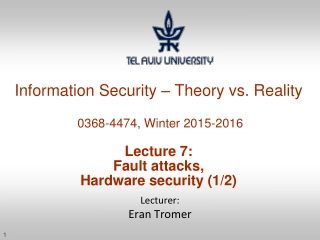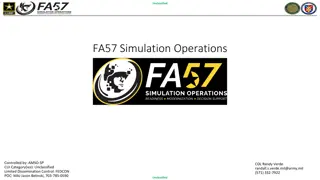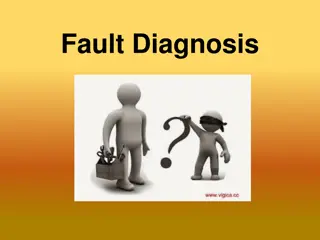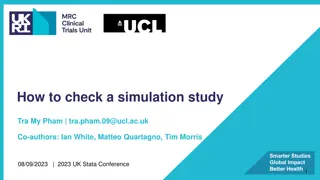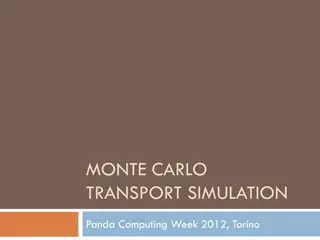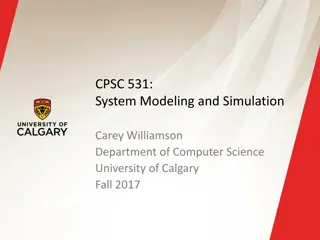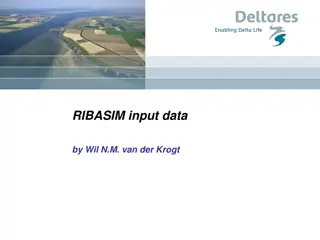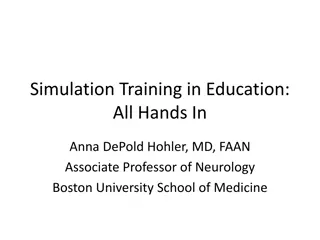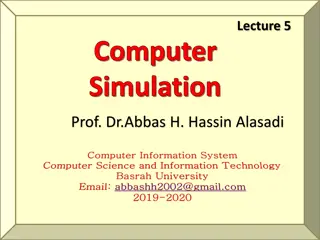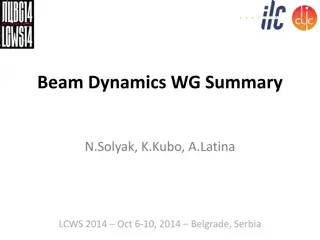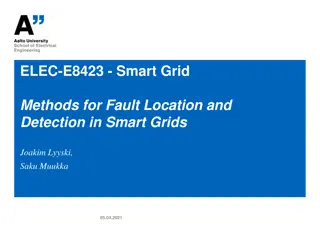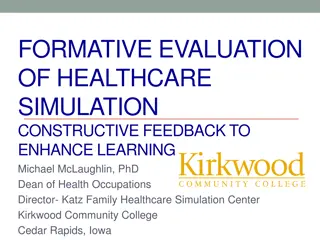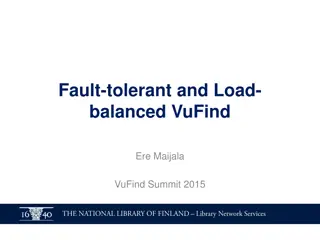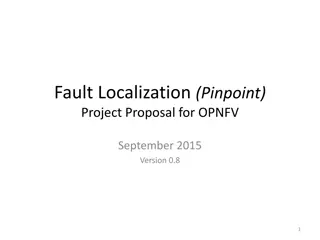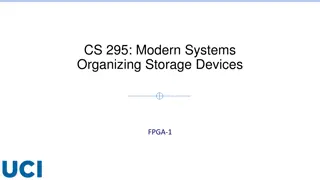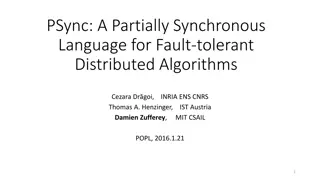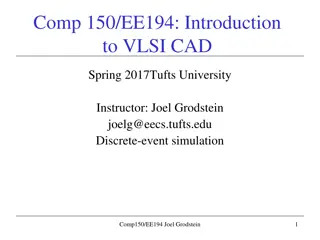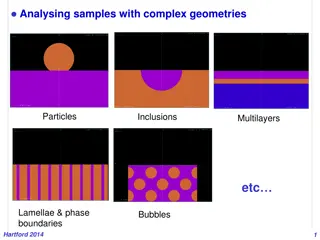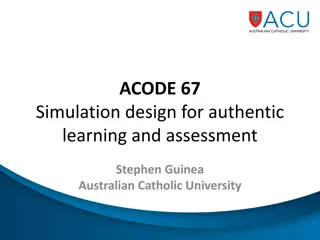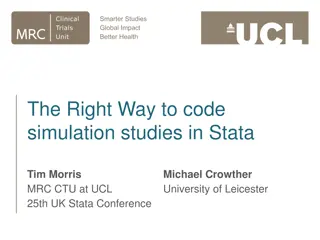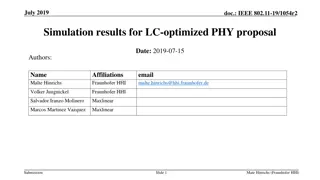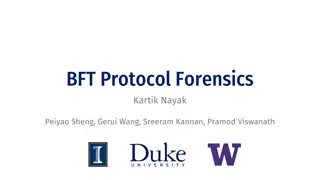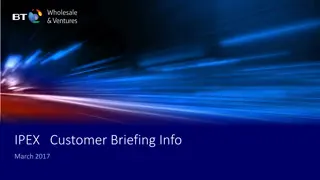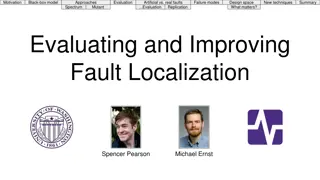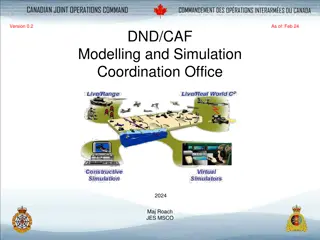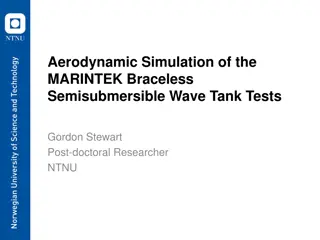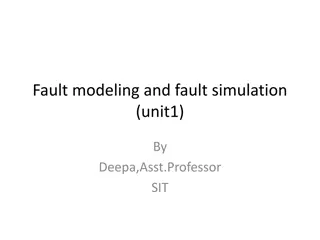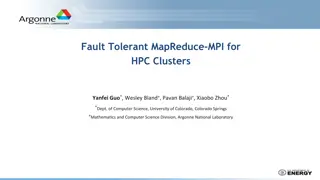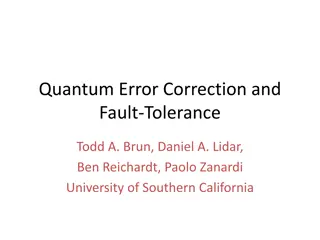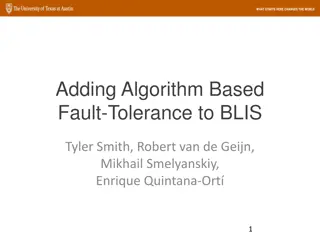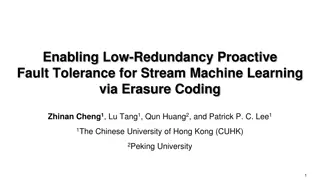Information Security – Theory vs. Reality
Exploring the concept of fault attacks in hardware security, this lecture delves into the various techniques used to compromise systems through non-nominal and nominal channels, as well as the potential risks introduced by trojan horses in the IT supply chain. The discussion includes differential fa
2 views • 37 slides
Cisco Systems Fault Managed Power Portfolio Overview
Cisco Systems offers an industry-leading Fault Managed Power (FMP) patent portfolio comprising 24 active assets across seven INPADOC families. The portfolio includes patents supporting fault-managed power systems, PoE deployments, DC power distribution, DC-DC conversion, and HVDC connectors. The FMP
4 views • 4 slides
Overview of Distributed Systems: Characteristics, Classification, Computation, Communication, and Fault Models
Characterizing Distributed Systems: Multiple autonomous computers with CPUs, memory, storage, and I/O paths, interconnected geographically, shared state, global invariants. Classifying Distributed Systems: Based on synchrony, communication medium, fault models like crash and Byzantine failures. Comp
9 views • 126 slides
System Modeling and Simulation Course Overview
This course covers the basics of systems modeling, discrete-event simulation, and computer systems performance evaluation. Topics include Monte Carlo simulation, probability models, simulation output analysis, queueing theory, and more. Professor Carey Williamson leads the course with a focus on pra
4 views • 21 slides
Power System Fault Calculation and Protection Analysis
In this technical document, we delve into the calculation of fault current and fault apparent power in symmetrical three-phase short circuit scenarios within power systems. Through detailed equivalent circuit diagrams, reactance calculations, and per unit value derivations, the fault current and app
5 views • 15 slides
Overview of Army Modeling and Simulation Office
The U.S. Army Modeling and Simulation Office (AMSO) serves as the lead activity in developing strategy and policy for the Army Modeling and Simulation Enterprise. It focuses on effective governance, resource management, coordination across various community areas, and training the Army Analysis, Mod
1 views • 8 slides
Understanding Fault Diagnosis in Mechanical and Electrical Systems
Explore the essential methods and techniques for fault diagnosis in mechanical and electrical systems in industrial settings. Learn to identify different types of faults, utilize fault-finding aids, and rectify issues promptly to prevent future failures. Discover industry-recognized fault diagnosing
2 views • 27 slides
How to Check a Simulation Study: Methods and Considerations
Simulation studies are often used to evaluate statistical methods and study power, but they can sometimes produce misleading results. This work discusses strategies to assess and improve the quality of simulation studies, drawing on experiences and considerations outlined in relevant literature. A s
0 views • 31 slides
Customer Controlled SFI (CCSFI) Fault Raising Guide
This guide by British Telecommunications plc provides detailed instructions on raising a Customer Controlled Special Faults Investigation (CCSFI) fault. It covers topics such as Version Control, Best Practices for Knowledge Based Diagnostics (KBD) and CCSFI, logging in, and step-by-step guidance for
0 views • 19 slides
Guide to Raising a Fault with British Telecommunications plc
This guide by British Telecommunications plc provides detailed instructions on raising a fault, including best practices, version control, and using Knowledge Based Diagnostics (KBD) for diagnosing 21C copper and fibre broadband issues. It covers logging in, running KBD, accessing fault reporting to
0 views • 15 slides
Understanding Monte Carlo Transport Simulation
Monte Carlo simulation is a stochastic technique that uses random numbers and probability statistics to investigate and solve problems. In the context of transport simulation, a Monte Carlo program simulates the passage of particles through matter, involving geometry, transport, visualization, detec
0 views • 11 slides
System Modeling and Simulation Overview
This content provides insights into CPSC 531: System Modeling and Simulation course, covering topics such as performance evaluation, simulation modeling, and terminology in system modeling. It emphasizes the importance of developing simulation programs, advantages of simulation, and key concepts lik
0 views • 28 slides
Understanding Seismic Source Parameters in Earthquake Dynamics
The seismic source parameters in earthquake dynamics involve describing a fault as a discontinuity causing displacements, requiring a complex treatment of forces. The Earth's equilibrium necessitates a specific system of forces to explain displacements along faults. The seismic moment tensor, consis
4 views • 32 slides
Basin Manipulation Simulation Analysis Tool Overview
Basin Manipulation Simulation Analysis Tool provides a comprehensive solution for managing and analyzing basin data, including tasks like basin manipulation, simulation analysis, case management, and defining simulation time steps. The tool allows for easy data entry, visualization of simulation res
2 views • 17 slides
Simulation Training in Education: Enhancing Learning Through Hands-On Simulation
Hands-on simulation training in education provides students with valuable learning experiences by increasing self-reported knowledge and technical proficiency. Simulations help improve students' knowledge, experience, and comfort with challenging procedures in a lower-risk environment, leading to en
0 views • 13 slides
Understanding Computer Simulation and Modeling Tools
Computer simulation and modeling is essential for conducting studies in various fields. Selecting the right simulation language or package is crucial for accurate results. This involves considering the characteristics of the language, such as random number generation, process transformers, list proc
0 views • 7 slides
Advanced Beam Dynamics and Machine Protection in High-Energy Linacs
Overview of recent talks and discussions at LCWS 2014 in Belgrade, Serbia, focusing on machine protection, simulation codes, instrumentation, and system tests. Topics include beam-loss monitors, dark current measurements, simulation code developments, and beam dynamics studies in linacs. Key speaker
0 views • 12 slides
Fault Location and Detection in Smart Grids
Fast and accurate fault detection and location are crucial in power grid management, especially in smart grids with bidirectional power flow. This study explores various fault location methods including impedance-based and travelling waves-based approaches. It also discusses the use of Intelligent E
0 views • 10 slides
Enhancing Healthcare Simulation Through Constructive Feedback
Explore the principles and benefits of healthcare simulation, focusing on formative evaluation and constructive feedback to improve learning outcomes. Delve into the role of formative assessment tools, TeamSTEPPS model, and Mayo High Performance Teamwork Scale in simulation scenarios. Discover the s
0 views • 37 slides
Fault-tolerant and Load-balanced VuFind Project Overview
Project Background: Part of the National Digital Library initiative, the VuFind project aims to provide a discovery interface for Finnish archives, libraries, and museums. It started development in 2012 due to the insufficiency of existing commercial products. The focus is on enhancing fault toleran
1 views • 19 slides
Fault Localization (Pinpoint) Project Proposal Overview
The Fault Localization (Pinpoint) project proposal aims to pinpoint the exact source of failures within a cloud NFV networking environment by utilizing a set of algorithms and APIs. The proposal includes an overview of the fault localization process, an example scenario highlighting the need for fau
0 views • 12 slides
Understanding RAID 5 Technology: Fault Tolerance and Degraded Mode
RAID 5 is a popular technology for managing multiple storage devices within a single array, providing fault tolerance through data striping and parity blocks. This article discusses the principles of fault tolerance in RAID 5, the calculation of parity blocks, handling degraded mode in case of disk
0 views • 12 slides
PSync: A Partially Synchronous Language for Fault-tolerant Distributed Algorithms
PSync is a language designed by Cezara Drăgoi, Thomas A. Henzinger, and Damien Zufferey to simplify the implementation and reasoning of fault-tolerant distributed algorithms. It introduces a DSL with key elements like communication-closed rounds, an adversary environment model, and efficient runtim
0 views • 22 slides
Beam Polarization Simulation Study for CEPC
Simulation study on beam polarization for the Circular Electron Positron Collider (CEPC) using the PTC Poly- morphic Tracking Code. The study includes orbital and spin tracking, equilibrium polarization calculation, and Monte-Carlo simulation of depolarization rate. Comparison with other Monte-Carlo
0 views • 20 slides
Introduction to VLSI CAD and Discrete-Event Simulation at Tufts University
This course introduces students to event-oriented simulation, building virtual models, and validating designs through simulation. It covers the importance of simulation in testing and refining designs before implementation. Examples include simulating VLSI networks and exploring the use of discrete-
0 views • 32 slides
Advanced Simulation Techniques for Analyzing Samples with Complex Geometries
Explore the capabilities of PENELOPE simulation software for analyzing samples with intricate structures like particles, inclusions, multilayers, lamellae, and phase boundaries. The software facilitates detailed investigations of material composition and electron-photon transport in diverse geometri
0 views • 28 slides
Simulation Design for Authentic Learning and Assessment at ACU
Simulation design for authentic learning and assessment is a crucial aspect of education, particularly in the healthcare field. At the Australian Catholic University (ACU), simulation plays a significant role in providing students with authentic experiences that bridge the gap between theory and pra
0 views • 18 slides
The Right Way to Code Simulation Studies in Stata
Simulation studies in Stata involve using (pseudo) random numbers to generate data from a distribution for studying statistical methods. This process helps to evaluate different scenarios and understand the properties of statistical techniques. Key components like ADEMP (Aims, Data-generating mechan
1 views • 18 slides
Simulation Results for LC-Optimized PHY Proposal in July 2019
The document presents simulation results for an LC-optimized PHY proposal for TGbb based on G.9991 PHY. It includes details on the simulation setup, frame detection results, header modulation, coding simulation results, payload modulation, and coding simulation results. The setup involved various re
0 views • 18 slides
Byzantine Fault Tolerance: Protocols, Forensics, and Research
Explore the realm of Byzantine fault tolerance through protocols like State Machine Replication and HotStuff, discussing safety, liveness, forensic support, and the impact of Byzantine faults. Dive into decades of research on achieving fault tolerance and examining forensic support in the face of By
0 views • 24 slides
Thermoelectric Module with PID Control Simulation
This simulation showcases a lumped thermoelectric module with PID control. The model evaluates the performance of a thermoelectric element in a nonisothermal fluid flow around a heat sink. A stationary simulation assesses the module's capabilities, followed by a transient simulation with a PID contr
0 views • 7 slides
Upcoming Changes to IPEX Fault Reporting Journey
This pack explains the upcoming changes to the IPEX fault reporting journey for customers. A new BT Wholesale Voice Products Ordering and Support System will be introduced in March 2017. Customers will need to transition to the new online IPEX fault reporting journey via the BTWholesale.com web port
0 views • 6 slides
Exploring Fault Localization Techniques in Software Debugging
Various fault localization techniques in software debugging are discussed, including black-box models, spectrum evaluation, comparison of artificial and real faults, failure modes, and design considerations. The importance of effective fault localization and improving fault localization tools is hig
0 views • 24 slides
Defense Modeling and Simulation Coordination Office Overview
The Defense Modeling and Simulation Coordination Office (DND/CAF MSCO) is responsible for managing contractors, policies, and strategic activities related to modeling and simulation within the Canadian Armed Forces. The office focuses on supporting various organizations and enhancing capabilities th
0 views • 6 slides
Aerodynamic Simulation of MARINTEK Braceless Semisubmersible: Insights and Tools
Explore the aerodynamic simulation of the MARINTEK Braceless Semisubmersible through advanced techniques and tools. Discover the unique aerodynamic actuator, simulation models, and tools used in the research conducted by Gordon Stewart, a post-doctoral researcher at NTNU. Gain insights into the expe
0 views • 16 slides
Comprehensive Overview of Fault Modeling and Fault Simulation in VLSI
Explore the intricacies of fault modeling and fault simulation in VLSI design, covering topics such as testing philosophy, role of testing in VLSI, technology trends affecting testing, fault types, fault equivalence, dominance, collapsing, and simulation methods. Understand the importance of testing
0 views • 59 slides
Fault-Tolerant MapReduce-MPI for HPC Clusters: Enhancing Fault Tolerance in High-Performance Computing
This research discusses the design and implementation of FT-MRMPI for HPC clusters, focusing on fault tolerance and reliability in MapReduce applications. It addresses challenges, presents the fault tolerance model, and highlights the differences in fault tolerance between MapReduce and MPI. The stu
1 views • 25 slides
Quantum Error Correction and Fault Tolerance Overview
Quantum error correction and fault tolerance are essential for realizing quantum computers due to the challenge of decoherence. Various approaches, including concatenated quantum error correcting codes and topological codes like the surface code, are being studied for fault-tolerant quantum computin
0 views • 19 slides
Enhancing Fault Tolerance in BLIS with Algorithm-Based Techniques
Addressing the challenge of soft errors in supercomputers, this paper introduces algorithm-based fault tolerance methods to enhance the resilience of systems like BLIS. By integrating Application-Based Fault Tolerance (ABFT) into BLIS, the study aims to improve error detection and correction mechani
0 views • 48 slides
Low-Redundancy Proactive Fault Tolerance for Stream Machine Learning
This study focuses on enabling fault tolerance for stream machine learning through erasure coding. Fault tolerance is crucial in distributed environments due to worker failures, and existing approaches like reactive fault tolerance and proactive replication have drawbacks. The use of erasure coding
0 views • 20 slides
